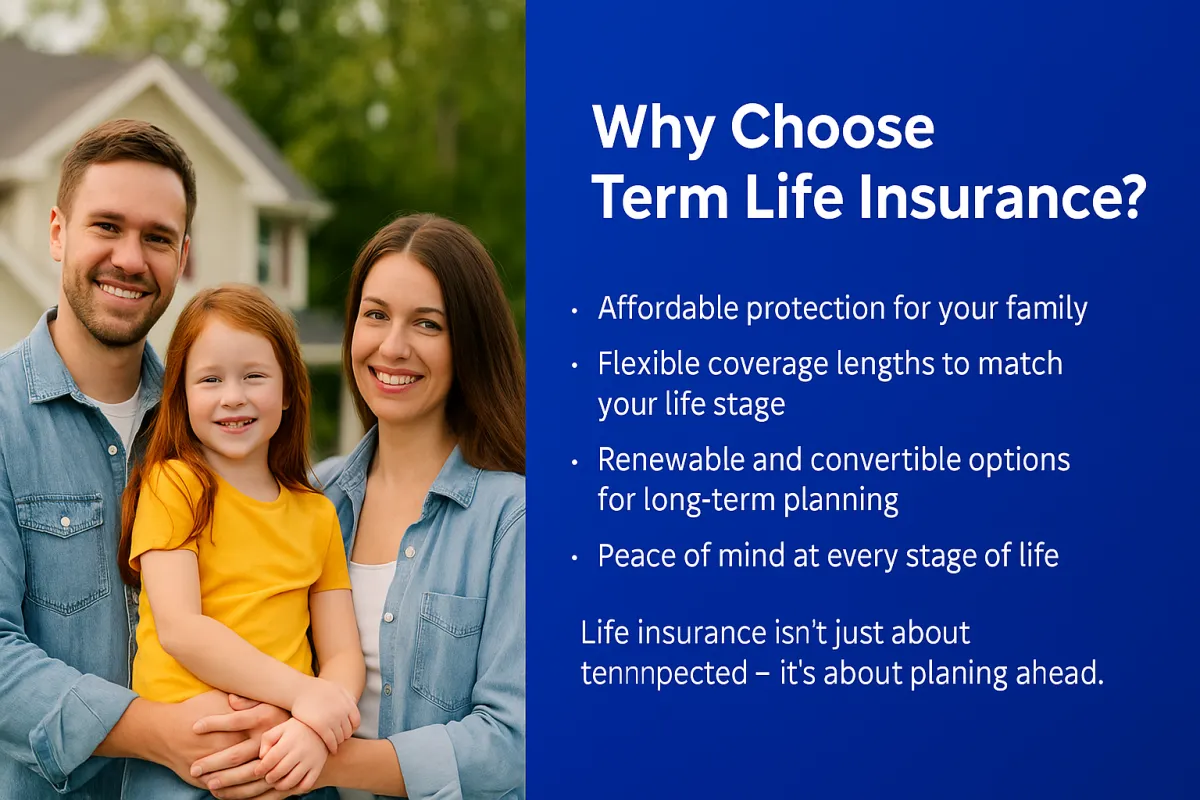Secure
Your Future
Protecting Your Loved Ones with Reliable
Life Insurance Solutions
What is Term insurance
Term life insurance is a simple and affordable Canadian solution that provides tax-free payments in the event of death. This coverage is particularly helpful if you have a mortgage in Canada, or if you are a parent to young children and want to provide financial support for their needs until they are independent. Term life insurance is available to all Canadian citizens and newcomers to Canada.

2 Types of Term Insurance
Simplified Issue Term Insurance
Designed for people who often find it difficult to get insured because of their age, health, or where they are from.
It’s available in 15, 20, or 25-year terms, giving you flexibility to choose what fits best with your stage of life.
The application process is simple: there’s no medical exam required. Instead, you just answer a few straightforward health questions, making it quick and easy to get the coverage you need.
This type of insurance provides an accessible way to protect your loved ones and give yourself peace of mind, even if traditional insurance options have been out of reach.
Pick A Term
Designed for young families who are balancing multiple financial commitments and want strong protection during the years when their children depend on them most.
This flexible plan lets you choose a term anywhere from 10 to 40 years, depending on your needs and future plans.
It’s tailored to cover major obligations such as your mortgage, line of credit, car loan, and other debts, giving you peace of mind that your family will be financially protected if something unexpected happens.
With Pick-A-Term, you can match your coverage to your life stage — maximizing your insurance when you need it most.
Protections adapted to your needs

Gina, age 26
Teacher
Single, renter
Female, non-smoker
Young professional and recent graduate, Gina would like to take out a term life insurance policy while she is young and healthy. She would like to protect her family from her student and car loan debt.
The solution
$9 / month*
10 Year Term
Coverage: $100,000

Mat, age 35
Engineer,
Homeowner
Mat recently purchased a home with his spouse and would like to start a family soon. He wants to protect his investments and guarantee his family’s security.
The solution
$45 / month*
20 Year Term
Coverage: $750,000

Julie, age 50
Works for government
2 teenage daughters
Female, non-smoker
Julie wants to cover her needs until her two children leave home. She wants to leave her family a debt-free inheritance in the event of her premature death.
The solution
$61 / month*
15 Year Term
Coverage: $350,000
**illustration only, rates are subject to change and may not reflect your exact situation
How much does it cost?
Term life insurance is often very affordable — starting at less than $15 a month for young, healthy non-smokers. Your exact rate depends on age, health, coverage amount, and term length.
When do you need term life insurance?
Term life insurance is most important when you have financial responsibilities that others depend on — like a mortgage, young children, debts, or a spouse who relies on your income. It ensures your family is protected during the years they need you most.
How much insurance coverage do you need?
A common rule of thumb is 7–10 times your annual income, but the right amount depends on your family’s needs, debts, mortgage, and future goals like education or retirement. The goal is to replace your income and cover major expenses so your loved ones remain financially secure.
How long should your coverage term be?
Your term should match the length of your biggest financial responsibilities. For example, choose a term that lasts until your mortgage is paid off, your kids finish school, or your income is no longer needed to support your family.
What are your options when your term ends? Can you convert to a longer term?
When your term ends, most policies let you renew for another term, usually at higher rates based on your age at renewal. Many plans also include a conversion option, which allows you to switch to a permanent policy — like whole life or universal life — without a medical exam. This way, you can keep coverage in place even if your health changes.
Can you cash out term life insurance?
No — term life insurance does not build cash value, so there’s nothing to cash out. It’s designed to provide affordable protection for a set period of time. If you want coverage with a savings or investment component, you’d need a permanent policy like whole life or universal life insurance.
What are the disadvantages of term life insurance?
Term life insurance is affordable and flexible, but it has limits. Once the term ends, coverage stops unless you renew — and renewal rates are usually much higher as you get older. It also doesn’t build cash value, so there’s no savings or investment component.
